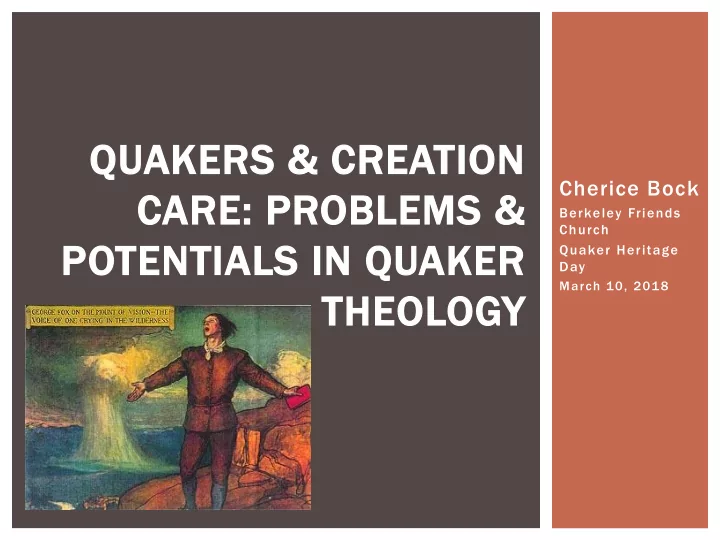

QUAKERS & CREATION Cherice Bock CARE: PROBLEMS & Berkeley Friends Church POTENTIALS IN QUAKER Quaker Heritage Day March 10, 2018 THEOLOGY GY
ECO-REFORMATION
DESERT FATHERS & MOTHERS, AUGUSTINE
WHAT HAPPENED? Universal message Imperial interpretation Conflation of philosophy & theology Eradicate nature worship in Europe (emphasis on male leadership) Land acquisition, vested interest in feudal system
HEBREW COSMOLOGY God’s in-breaking Word creates Positive: God created everything, and it’s all “good” Negative: easily translates to Greek dualism (order vs. chaos, Word vs. matter)
GREEK COSMOLOGY Realm of the gods hierarchically separate from realm of matter
GREEK COSMOLOGY Plato, Aristotle: forms, unmoved mover
ANTHROPOCENTRIC HIERARCHY
IMMANENCE VS. TRANSCENDENCE God becomes human: immanent Jesus leaves to go be with God: transcendent Sends Holy Spirit: immanent and transcendent
SALVATION: PERSONAL OR COMMUNAL? Personal: each receives offer of grace Communal: available to all (not just the elect)
TRINITY Individual Persons Co-inhering, co-indwelling Relational Radically Other
ESCHATOLOGY: WHERE IS THE KINGDOM? “My kingdom is not of this world” ( Jn 18:36) The Kingdom of God is within you/among you (all) (Lk 17:21)
LYNN WHITE, JR. (1967), “THE HISTORICAL ROOTS OF OUR ECOLOGICAL CRISIS” Anthropocentrism Hierarchy Dualism Change in understanding of natural theology Failure of St. Francis’ understanding of other created things being bound up in the salvation story (Rom 8:18-25)
PROTESTANT REFORMATION Indulgences
GEORGE FOX Hierarchy Found God in creation
PROBLEMS Enlightenment: rationality, objectivity, separation
PROBLEMS Enlightenment: rationality, objectivity, separation Classical economics: land, labor, capital; interchangeable
PROBLEMS Enlightenment: rationality, objectivity, separation Classical economics: land, labor, capital; interchangeable Unlimited growth
CLASSICAL ECONOMIC MODEL
SOCIAL-ECOLOGICAL SYSTEM
PROBLEMS Enlightenment: rationality, objectivity, separation Spiritualizing
PROBLEMS Enlightenment: rationality, objectivity, separation Spiritualizing No physical sacraments
PROBLEMS Enlightenment: rationality, objectivity, separation Spiritualizing Personalizing
PROBLEMS Enlightenment: rationality, objectivity, separation Spiritualizing Personalizing Inward Light
PROBLEMS Enlightenment: rationality, objectivity, separation Spiritualizing Personalizing Inward Light Intellectualism, anti-intellectualism
PROBLEMS Enlightenment: rationality, objectivity, separation Spiritualizing Personalizing Rituals & culture
POTENTIALS Taking the Bible seriously
POTENTIALS Taking the Bible seriously Emphasis on social justice
POTENTIALS Taking the Bible seriously Emphasis on social justice Partially realized eschatology (Kingdom of God here and now)
POTENTIALS Taking the Bible seriously Emphasis on social justice Partially realized eschatology (Kingdom of God here and now) Direct actions and willingness to be counter-cultural
POTENTIALS Taking the Bible seriously Emphasis on social justice Communalism
POTENTIALS Taking the Bible seriously Emphasis on social justice Communalism Recognizing God at work in other cultures, rituals
POTENTIALS Taking the Bible seriously Emphasis on social justice Communalism Recognizing God at work in other cultures, rituals No hard line between sacred and profane or secular
POTENTIALS Taking the Bible seriously Emphasis on social justice Communalism Recognizing God at work in other cultures, rituals No hard line between sacred and profane or secular Breaks down dualism
POTENTIALS Taking the Bible seriously Emphasis on social justice Communalism Recognizing God at work in other cultures, rituals No hard line between sacred and profane or secular Breaks down dualism Way open for recognition of God in creation
POTENTIALS Taking the Bible seriously Emphasis on social justice Communalism Recognizing God at work in other cultures, rituals No hard line between sacred and profane or secular Breaks down dualism Way open for recognition of God in creation Interconnectedness
POTENTIALS Taking the Bible seriously Emphasis on social justice Communalism Recognizing God at work in other cultures, rituals No hard line between sacred and profane or secular Emphasis on the Spirit
SPIRIT Ruach ( ַ חוֽ֫ר ): Hebrew for Spirit, spirit, wind, breath, mind; that which animates or gives life Pneuma ( πνε ῦ μα ): Greek for Spirit, spirit, wind, breath; creative force of a person
POTENTIALS Taking the Bible seriously Emphasis on social justice Communalism Recognizing God at work in other cultures, rituals No hard line between sacred and profane or secular Emphasis on the Spirit “ Prophethood ” of all believers
POTENTIALS Taking the Bible seriously Emphasis on social justice Communalism Recognizing God at work in other cultures, rituals No hard line between sacred and profane or secular Emphasis on the Spirit “ Prophethood ” of all believers Simplicity
BOTH/AND Transcendent and immanent Body and spirit Kingdom is within us and not yet here (implications for place) God present in and separate from creation Interconnected = related and other Salvation and grace are personal and communal
OVERVIEW Problems Potentials Taking the Bible seriously Enlightenment: Emphasis on social rationality, objectivity, justice separation Communalism Spiritualizing Recognizing God at work in other cultures, rituals Personalizing No hard line between Rituals & culture sacred and profane or secular Emphasis on the Spirit Prophets Simplicity
Recommend
More recommend